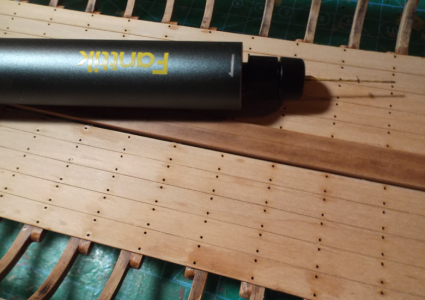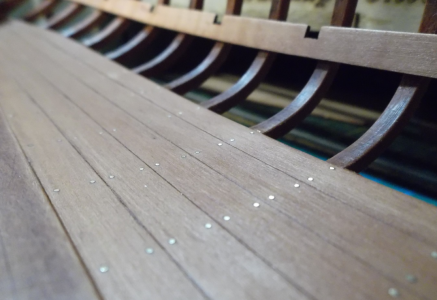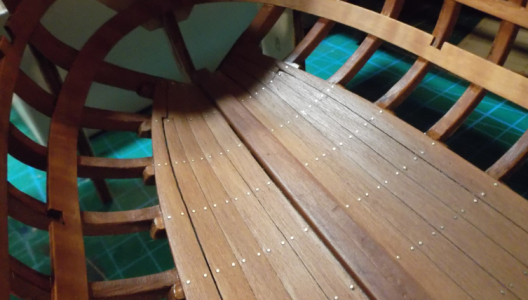Thx. The holes are for 0.5mm copper wire nails.I Presumed its for tree nails
I used this as my latest nothing comes close it does eveything
Only use my dremel in the table bench
Bought it from Amazon
Incidentally i drill a series of holes in a Pipe Tobacco tin lid !!!!! (Not smoked for 35 years)
And i still use it .5mm may be right but its to small
I bought some 1mm timber (Same as my ship) and pull that through
Dont go too small its imposible to do and the dont show
If you need a photo of my plate i will try and find it
THIS IS THe second best tool i have
DEPSTECH Cordless Rotary Tool, 2.0 Ah 8V Rechargeable Multi Tool Kit 5 Speed 30000RPM
-

Win a Free Custom Engraved Brass Coin!!!
As a way to introduce our brass coins to the community, we will raffle off a free coin during the month of August. Follow link ABOVE for instructions for entering.
You are using an out of date browser. It may not display this or other websites correctly.
You should upgrade or use an alternative browser.
You should upgrade or use an alternative browser.
Seeking small electric pin vise (drill) recommendations
Looks good. Just ordered one.I Presumed its for tree nails
I used this as my latest nothing comes close it does eveything
Only use my dremel in the table bench
Bought it from Amazon
Incidentally i drill a series of holes in a Pipe Tobacco tin lid !!!!! (Not smoked for 35 years)
And i still use it .5mm may be right but its to small
I bought some 1mm timber (Same as my ship) and pull that through
Dont go too small its imposible to do and the dont show
If you need a photo of my plate i will try and find it
THIS IS THe second best tool i have
DEPSTECH Cordless Rotary Tool, 2.0 Ah 8V Rechargeable Multi Tool Kit 5 Speed 30000RPM
I've tried Arromax. Fortunately, I was able to return both because they wobble too much. Many reviews also mention that they lack precision.
I like MS.HOBBY MS-091 Double Bearing Decompression Automatic Hand Drill
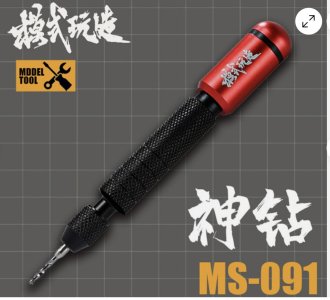
And DSPIAE ES-P Mini Rotary Electric Grinder. I like the precision and light weight of this tool
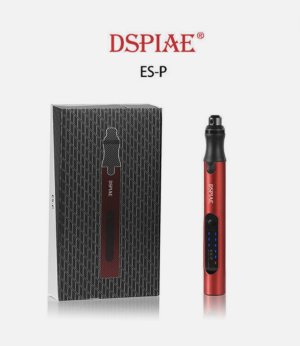
Had to use Reamer 1/8" H7 6 Straight Flutes to convert 3mm to 1/8" as all of my bits are 1/8".
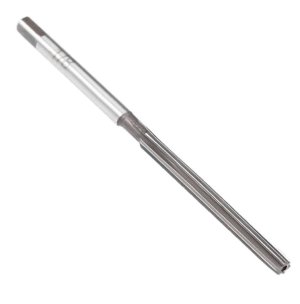
Yuri
I like MS.HOBBY MS-091 Double Bearing Decompression Automatic Hand Drill

And DSPIAE ES-P Mini Rotary Electric Grinder. I like the precision and light weight of this tool

Had to use Reamer 1/8" H7 6 Straight Flutes to convert 3mm to 1/8" as all of my bits are 1/8".

Yuri
Last edited:
I've had problems controlling the drill bit with high speed RPM's like with a Dremel and came up with a ,for me, great solution. I bought an electric screw driver. Nice slow speed and easy to control the bit. I also had to buy a collet to chuck the bit into but that was no problem. Now I can drill tiny holes all over the place and not break anything like a pully or split a plank. It was a super answer to the high speed problem I was having.
- Joined
- Feb 15, 2019
- Messages
- 358
- Points
- 168

You can get a mini Dremel, corded. Mine works for me, I'd recommend it.I have maybe a thousand 0.5 mm nail holes to drill in my hull. (Dunno really, haven’t counted em yet)
Don’t want to use my Dremel nor my manual pin vise.
What small portable electric drill do you recommend?
1. Harbor freight has a small blue drill that sells for about 10 bucks. I bought 10 of them (when they were on sale one day for 8 bucks) in a fit of madness.I have maybe a thousand 0.5 mm nail holes to drill in my hull. (Dunno really, haven’t counted em yet)
Don’t want to use my Dremel nor my manual pin vise.
What small portable electric drill do you recommend?
2. I used the first drill (it lasted the entire job and I have never opened a second one) to put in about 50,000 drill holes for number 24 copper wire "trunnels" in a model of L' Hermione' at 1/48. The fastener head would be about 1 inch scale, so just do the math for the HSS drill and wire diameter at your reduction ratios.
3. This first drill is 5 years old and still works just fine (although I doubt I will ever put 50k holes in another model hull.
4. Do not cut the wire into short lengths. Just drill a hole, dip the wire end into CYA, push the end into the hole, cut it short and file the stub fair with the hull with needle file. The entire process is easy but laborious.
5. I used HSS drills; I doubt carbide drills will last more than a few holes. The drill diameter was about 0.02 inches; an error of 0.01", more or less, is irrelevant. The drills do not break but dull, so buy a lot.
6. I used CYA for glue, did not cut the wire into short lengths and used needle files to fair the wire with the hull. The work is tedious, but progress is steady. Corroded wire holds better than shiny wire; in either case just clean the wire with alcohol. With the CYA I used, the corroded wire would break before it would pull out.
Last edited:
- Joined
- Jun 29, 2024
- Messages
- 1,208
- Points
- 393

If you plan to “nail” an entire hull with any material harder than the planking you might want to invest in a set of rifflers. These are bent files that allow you to concentrate the file’s action at a small point without affecting the surrounding material. Miniature rifflers are available.
Rogr
Rogr
Thx. I like that. So I will also dip my wire in CA, insert and cut.1. Harbor freight has a small blue drill that sells for about 10 bucks. I bought 10 of them (when they were on sale one day for 8 bucks) in a fit of madness.
2. I used the first drill (it lasted the entire job and I have never opened a second one) to put in about 50,000 drill holes for number 24 copper wire "trunnels" in a model of L' Hermione' at 1/48. The fastener head would be about 1 inch scale, so just do the math for the HSS drill and wire diameter at your reduction ratios.
3. This first drill is 5 years old and still works just fine (although I doubt I will ever put 50k holes in another model hull.
4. Do not cut the wire into short lengths. Just drill a hole, dip the wire end into CYA, push the end into the hole, cut it short and file the stub fair with the hull with needle file. The entire process is easy but laborious.
5. I used HSS drills; I doubt carbide drills will last more than a few holes. The drill diameter was about 0.02 inches; an error of 0.01", more or less, is irrelevant. The drills do not break but dull, so buy a lot.
6. I used CYA for glue, did not cut the wire into short lengths and used needle files to fair the wire with the hull. The work is tedious, but progress is steady. Corroded wire holds better than shiny wire; in either case just clean the wire with alcohol. With the CYA I used, the corroded wire would break before it would pull out.
Rifflers! Had no idea. Gonna get a couple. Thx.If you plan to “nail” an entire hull with any material harder than the planking you might want to invest in a set of rifflers. These are bent files that allow you to concentrate the file’s action at a small point without affecting the surrounding material. Miniature rifflers are available.
Rogr
Best "time saver" for ship modeling, on Amazon, works great, inexpensive. (And no, I have no connection to Amazon).Yeah. That’s the form factor I am looking for. Without the engraving functionality.
I’ve been looking on Amazon, but the reviews are all over the place.
So I came here, hoping that a fellow SOS modeler, who was using one of these, would comment.
- Joined
- Jul 24, 2016
- Messages
- 335
- Points
- 128

ok so ideal for thoseThx. The holes are for 0.5mm copper wire nails.
I use it with these drills VERY FRAGILE but they are easy to chene Guess you can but .5 mm only
Buy in buk really cheap
Thx everyone for all the help. I ordered 4 drills.
Two cheapies (A Jenabom and a Jangklife) from Temu that won't get here until mid-Oct. And two pricier drills from amazon that I got yesterday - the Depstech and the Fanttik F2. Plus some drill bits.
About those two drills - first off - neither of them had any wobble when spinning the 0.5mm bits at any speed. Perfect, eh?
However, they are two diff drills - with the Fanttik F2 being small and light enough for real tight work. And the Depstech is kind of my Dremel replacement - it's powerful enough, but lighter and easier to manage than my full size Dremel, plus it has a dust shield (which I'll gladly use when beveling frames).
Anyway, last night I drilled holes in the floor planking of my current project - using both the Fanttik F2 and the Depstech - and both worked - but the Fanttik F2 was much easier to position (with one hand even) and hold while working down in the bottom of the inside of that hull - it's got a light - and it's just so much smaller and lighter.
Happy with both purchases. Thx again to you all.
Two cheapies (A Jenabom and a Jangklife) from Temu that won't get here until mid-Oct. And two pricier drills from amazon that I got yesterday - the Depstech and the Fanttik F2. Plus some drill bits.
About those two drills - first off - neither of them had any wobble when spinning the 0.5mm bits at any speed. Perfect, eh?
However, they are two diff drills - with the Fanttik F2 being small and light enough for real tight work. And the Depstech is kind of my Dremel replacement - it's powerful enough, but lighter and easier to manage than my full size Dremel, plus it has a dust shield (which I'll gladly use when beveling frames).
Anyway, last night I drilled holes in the floor planking of my current project - using both the Fanttik F2 and the Depstech - and both worked - but the Fanttik F2 was much easier to position (with one hand even) and hold while working down in the bottom of the inside of that hull - it's got a light - and it's just so much smaller and lighter.
Happy with both purchases. Thx again to you all.
- Joined
- Jan 25, 2023
- Messages
- 453
- Points
- 278

Was that on a single charge or multiple? Or maybe you left it plugged in? About how long does a charge last?It took me 1.5 hours to drill 460 3-4 mm holes in this floor planking.
That was on a single charge - and I'm still using it for odd jobs. It can't be used while it's plugged in charging.Was that on a single charge or multiple? Or maybe you left it plugged in? About how long does a charge last?





